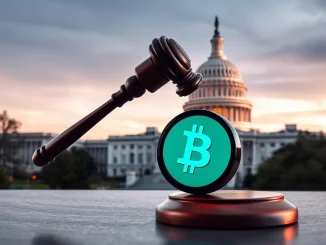
Have you heard about the latest move from Sweden concerning cryptocurrency? The news from the Nordic nation is making waves, particularly for anyone interested in how governments are tackling crime involving digital assets. Sweden’s Justice Minister, Gunnar Strömmer, is pushing for more aggressive use of a powerful new law aimed at seizing wealth obtained through illegal activities, and yes, that explicitly includes cryptocurrency.
Understanding the Sweden Crypto Seizure Push
The core of this initiative lies in a forfeiture law that came into effect in November. This isn’t just any piece of legislation; it significantly broadens the state’s power. Traditionally, authorities often had to secure a conviction for a specific crime before they could seize assets linked to that crime. This new Swedish law changes the game. It allows enforcement bodies to confiscate assets deemed to be the proceeds of crime without the need to prove a direct link to a specific criminal act. Think of it as targeting the ‘unexplained wealth’ of individuals involved in criminal networks.
Justice Minister Strömmer’s recent call, reported by Decrypt, is essentially an instruction to agencies like the tax authority and police to fully utilize this expanded legal toolkit. He’s urging them to not only apply the law but to do so more actively and strategically, focusing on high-profit assets that fuel organized crime.
Why the Swedish Justice Minister is Prioritizing This
Sweden, like many countries, faces challenges from organized crime. These groups often accumulate significant wealth, which they may try to hide or launder through various means, including digital assets. The traditional methods of asset recovery haven’t always been effective in keeping pace with the evolving tactics of criminals in the digital age.
The Swedish Justice Minister believes that targeting the financial foundation of these criminal networks is key to dismantling them. By making it easier to seize illicit gains, regardless of the specific crime proven, the government aims to make crime less profitable and disrupt the cycle of illegal activities. This proactive stance is seen as a necessary step to strengthen law enforcement’s ability to combat serious crime effectively.
How Does Crypto Asset Forfeiture Work in Practice?
Seizing physical assets like cars or property is one thing, but how do authorities actually seize digital assets like cryptocurrency? It’s complex and requires technical expertise and international cooperation.
Here are some key aspects of how crypto asset forfeiture can be pursued:
- Tracing Funds: Authorities use blockchain analysis tools to trace the flow of illicit funds across public ledgers.
- Identifying Wallets: The goal is to link traced transactions to specific wallets controlled by individuals or groups under investigation.
- Gaining Access: This is often the hardest part. Authorities may need to compel individuals to hand over private keys or access credentials. In some cases, if assets are held on centralized exchanges, they can work with the exchange to freeze and seize funds based on legal orders.
- Collaboration: Working with international partners and cryptocurrency exchanges is crucial, as crypto transactions often cross borders.
The new Swedish law simplifies the *legal* hurdle – proving the source of funds is illicit – but the *technical* challenge of locating and accessing the crypto remains.
Targeting Illegal Crypto Assets: Challenges and Collaboration
The call to target illegal crypto assets more aggressively highlights several ongoing challenges for law enforcement worldwide:
- Pseudonymity: While transactions are public, identifying the real-world individuals behind wallet addresses requires significant investigative work.
- Jurisdiction: Crypto operates globally. Seizing assets held on exchanges or in wallets in different countries requires international legal frameworks and cooperation agreements.
- Technical Complexity: Understanding different cryptocurrencies, blockchain protocols, and secure storage methods requires specialized skills within enforcement agencies.
- Rapid Evolution: The crypto landscape changes quickly, with new technologies and methods constantly emerging.
Minister Strömmer specifically called for closer collaboration between Swedish agencies, such as the police, the tax agency, and the customs service. Sharing information and expertise is vital for effectively tracing and seizing digital assets. Ramping up enforcement efforts means investing in the tools, training, and inter-agency coordination needed to meet these challenges head-on.
What Does This Mean for Users of Illicit Gains Crypto?
For individuals using cryptocurrency legitimately, this push for tougher seizures shouldn’t be a cause for alarm, provided they are compliant with tax laws and not involved in criminal activities. However, for those who have acquired wealth through illegal means and attempted to hide it in digital assets, the net in Sweden is tightening.
The focus is clearly on illicit gains crypto – funds derived from criminal enterprises. The law’s power to seize without needing a specific crime conviction means that merely possessing significant digital wealth that cannot be explained by legitimate income or activities could potentially put individuals under scrutiny if they are suspected of being involved in organized crime.
This serves as a strong signal that authorities are adapting to the digital age and are serious about pursuing wealth obtained through illegal means, regardless of whether it’s held in traditional bank accounts, physical assets, or cryptocurrencies.
In Conclusion: Sweden’s Strong Stance on Crypto Seizure
Sweden is taking a firm stand against organized crime by empowering its agencies to aggressively pursue and seize illicit assets, including cryptocurrencies. The Justice Minister’s call for more active use of the new forfeiture law signals a significant step in the country’s efforts to combat financial crime in the digital realm. While challenges remain in the technical execution of crypto seizures, the legal framework is now more robust, emphasizing the government’s commitment to making crime less profitable and protecting the integrity of its financial system.



